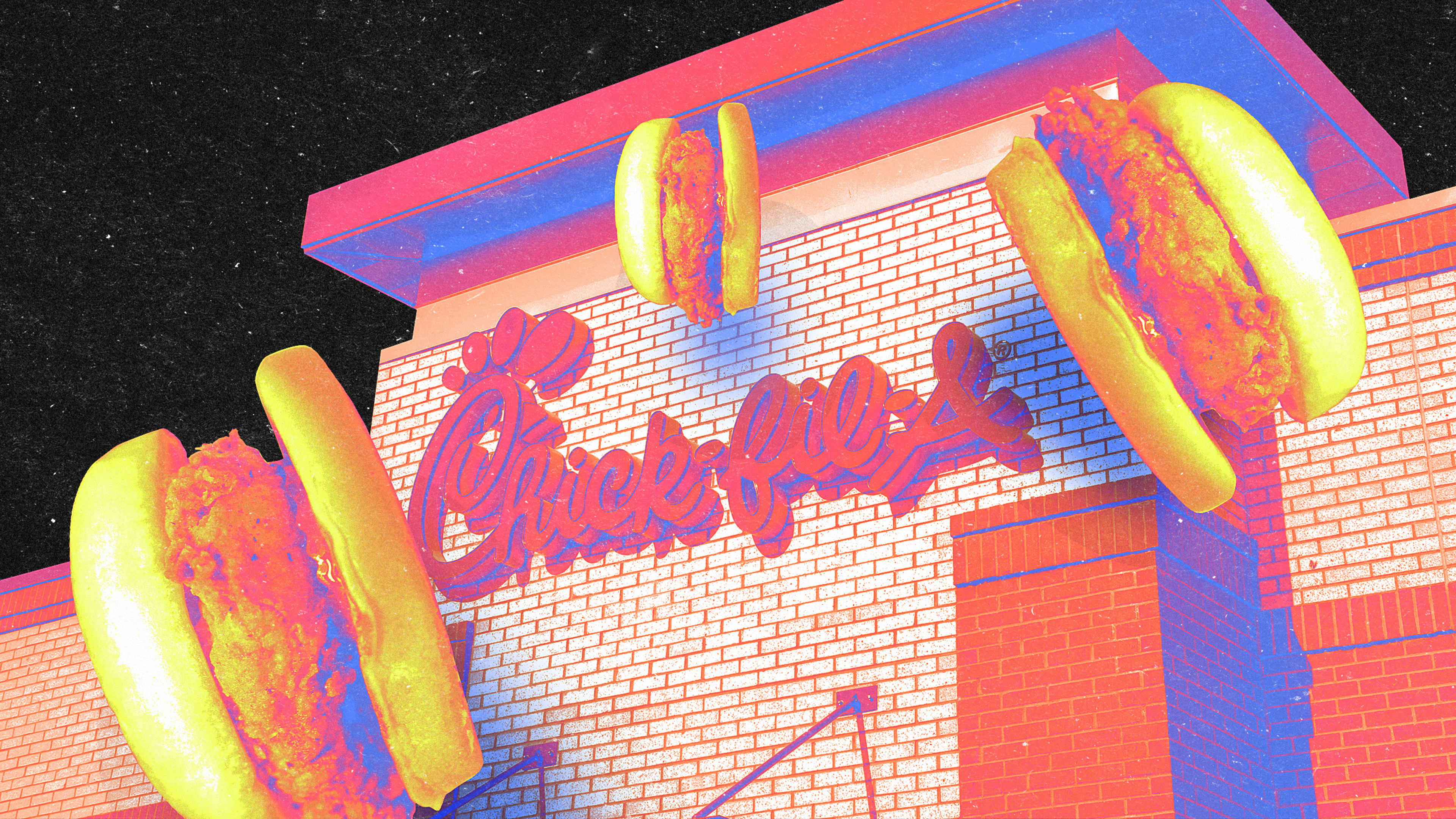Branded is a weekly column devoted to the intersection of marketing, business, design, and culture.
In what seems like some sort of turning point, Chick-fil-A has been declared “woke,” with a noisy chunk of conservative Twitter calling for a boycott.
The surprise here is twofold. First, of course, the Georgia-based chicken chain has long been considered “one of the more historically culturally conservative chains in America,” donating millions of dollars to “anti-LGBTQ groups,” according to The New Republic. While the company, which trumpets Christian values, and famously doesn’t operate on Sundays, stopped making such donations a few years ago, its chairman (and son of the chain’s founder) Dan Cathy has been a public opponent of same-sex marriage. The upshot is that Chick-fil-A has long been a boycott target for the left, particularly LGBTQ+ activists. It’s one of the last brands you’d expect to be accused of “wokeness.”
Second, the proximate cause of the sudden outrage appears to be somewhere between old news and completely random. While it’s hard to pinpoint exactly what started the uproar, a viral tweet from a far-right podcast host named Joey Mannarino, who identifies himself as a political consultant and “media personality,” represents one early specimen of the outbreak. “Chick-fil-A just hired a VP of Diversity, Equity and Inclusion,” he wrote late Monday in a tweet with nearly 7 million views. “Are we going to have to boycott?”
In reality, Chick-fil-A’s vice president of DEI has been in that role since 2021, and held a related DEI position for a year before that. Mannarino—after adding a homophobic remark—also linked to the chain’s official DEI statement, which is also not new. (A Chick-fil-A spokesperson declined to comment on the record, but confirmed the company had no recent DEI announcements.)
And in any case it hardly reads like an example of radical “wokeness.” “Chick-fil-A’s Corporate Purpose,” the statement begins, “is ‘To glorify God by being a faithful steward of all that is entrusted to us. To have a positive influence on all who come into contact with Chick-fil-A.’” This is followed by what seems pretty straightforward boilerplate about being “Better at Together,” a corporate goal that “means embedding Diversity, Equity & Inclusion in everything we do.” For example: “We intentionally promote equal opportunity through our processes and practices.” And so on. So not only is none of this a new Chick-fil-A stance or initiative, it’s a collection of sentiments nobody could seriously disagree with.
Except of course they could. Broadly speaking, the knock on DEI is that worrying about building a diverse and inclusive workforce distracts companies from being competitive and efficient, winning in the marketplace, and delivering shareholder value. Actually, there is research that points in the opposite direction—and in the real world many workers believe their employers’ DEI efforts don’t go far enough. (There’s a more over-the-top absurd critique positing that anything designed specifically to attract or retain people of color is in effect anti-white, and therefore, this twisted thinking goes, racist.)
And so the social media freakout was quickly picked up by conservative publications, and in turn amplified further on social media, and promptly went mainstream. Right-leaning activists, pundits, and influencers are in the midst of a kind of boycott-mania at the moment, vilifying Bud Light, Target, and Kohl’s, mostly with anti-transgender motives. Still, adding Chick-fil-A to the mix—for the supposedly momentous move of endorsing the idea of DEI—seems to be some kind of inflection point.
For starters, according to one 2021 study, more than half of all companies in the S&P 500 have a chief diversity officer. And companies from Walmart to Cracker Barrel to firearms maker Ruger, are among many that have DEI statements that sound a lot like Chick-fil-A’s. Boycotting every business that professed to care about diversity would be a bold step toward a hunter-gatherer existence.
At first the whole episode even seemed like a troll, or a prank. Certainly some social media observers on the progressive side of the ledger were dumbfounded that conservative tweeters were attacking a conservative corporate icon. It all seems as puzzling as recent and confusingly belated conservative complaints about Miller Lite marketing connected to Women’s History Month—marketing that ran back in March.
But perhaps the anti-”woke” mob means to test the limits of its line of attack in this anti ESG wave. A conservative publication called The Post Millennial argued the DEI statement’s assertion that one of the fast-food chain’s “core values” is “that we are better together” amounts to “a complete abandonment of its long-held Christian values.” Is an endorsement of togetherness anti-Christian? To avoid being accused of being too “woke,” do these critics believe a company now needs to declare actively discriminatory policies?
Maybe locating the outer edges of this strain of political rhetoric is the goal. If so, it’s possible that the exercise did produce a lasting result. Early tweeter Mannarino offered his following a poll asking whether “we” should boycott Chick-fil-A. At last check, 53.4% said no. So maybe, at last, we have reached peak anti-”wokeness.”
Recognize your brand’s excellence by applying to this year’s Brands That Matter Awards before the early-rate deadline, May 3.
